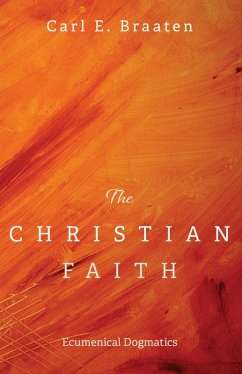
The Christian Faith (eBook, ePUB)
Ecumenical Dogmatics

PAYBACK Punkte
7 °P sammeln!
This single volume of dogmatics is an introduction to the Christian faith as such, written from an intentionally ecumenical perspective. Although this book is written by a Lutheran, its aim is to draw from the deep wells of the Christian tradition, its creeds and confessions, common to all denominations. Denominational dogmatics tends to define and defend the teachings of the Christian faith from the perspective of a particular church, in distinction from others. Ecumenical dogmatics is a relatively new attempt to focus on the beliefs and teachings fundamental to all communities that call them...
This single volume of dogmatics is an introduction to the Christian faith as such, written from an intentionally ecumenical perspective. Although this book is written by a Lutheran, its aim is to draw from the deep wells of the Christian tradition, its creeds and confessions, common to all denominations. Denominational dogmatics tends to define and defend the teachings of the Christian faith from the perspective of a particular church, in distinction from others. Ecumenical dogmatics is a relatively new attempt to focus on the beliefs and teachings fundamental to all communities that call themselves Christian. Such a project aims to be more irenic than polemical, intent on seeking and serving reconciliation and unity in Christ. The trinitarian and christological confessions of the first five centuries are foundational for all Eastern Orthodox, Roman Catholic, and Protestant Reformation churches and, despite all their subsequent differences and divisions, are quintessential in their journey toward reconciliation and reunion. These ancient creeds also suggest the appropriate outline for the organization of the contents of dogmatics even today, following the works of the triune God--creation, redemption, and sanctification.
Dieser Download kann aus rechtlichen Gründen nur mit Rechnungsadresse in A, D ausgeliefert werden.



